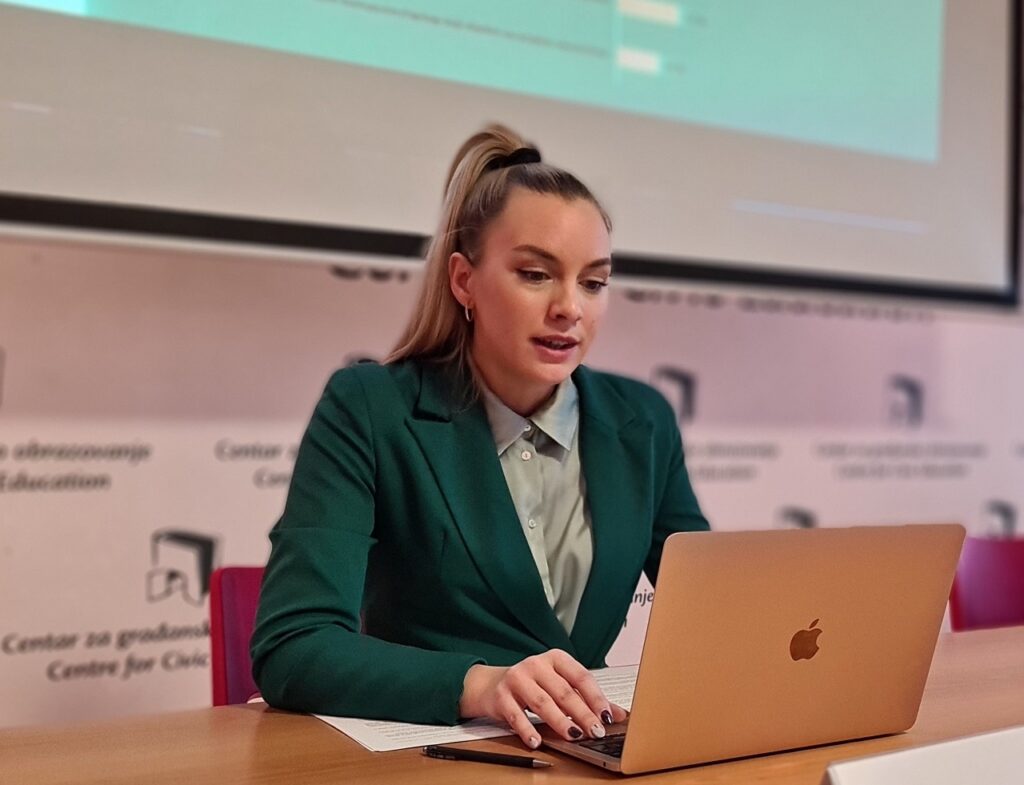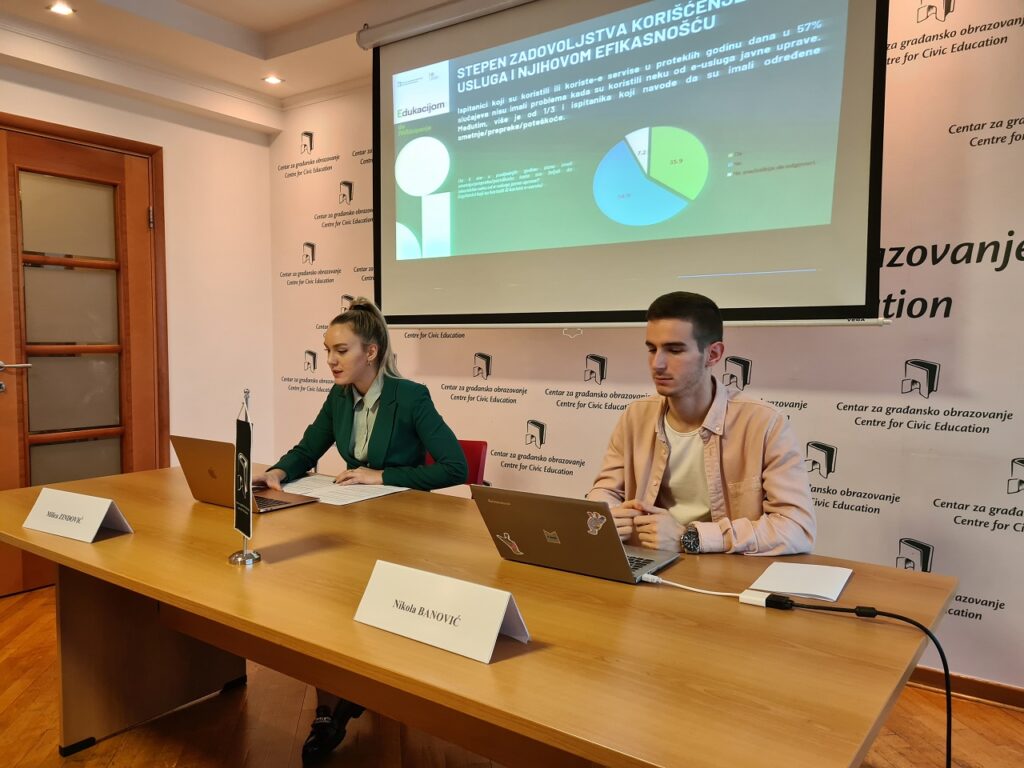Less than 30% of citizens of Montenegro who use Internet services are familiar with and have used some of the E-services of the public administration, whereas there are over two-fifths of citizens who are familiar with the existence of these services, but have never used them, and over one-quarter of citizens does not know that this kind of services even exist, was emphasized today in Centre for Civic Education (CCE) during the presentation of research of attitudes, perceptions and experience of citizens concerning E-services of public administration in Montenegro, as a part of the project „E-ducation to PARticipacion“, conducted by the CCE with the financial support of Ministry of Public Administration.
Nikola Banović, project assistant in the CCE, pointed out that the goal of this research is to determine the level of information and understanding of citizens in Montenegro about accessibility, benefits, and manners of using e-services, but also the level of satisfaction and trust in these services, their experience so far and challenges in using the existing services and eventual needs to introduce new ones.
While presenting research findings in detail, Milica Zindović, programme associate in the CCE, underlined that almost half of the citizens use the Internet all the time and a large number of them consider that they have developed skills for that, whereby they use the Internet mostly to access social media, video communication, access to news portals and magazines, etc.
„The data that less than a third of citizens have previously used E-services of the public administration indicates that this kind of digital information is not on a high level, which leaves a significant area to improve the state of affairs and policies in this field by the institutions, as well as better and more directed communication to make these services more popular and closer to the citizens“, stated Zindović.
Respondents who know which E-services of public administration are available, but have not used them, mostly cite as the primary reason that they did not have the need to use them or that the system is complicated, but also not a small number of respondents state that they feel safer when they submit the documentation directly. “These are indicators which should be taken into account by the decision-makers in this field to make interventions that would lead to enhancing the state of affairs in this area,” said Zindović.
Almost two-thirds of citizens get information about E-services through family members and colleagues, i.e through the exchange of the experience, and just over a quarter through websites of the institutions, whereas the next are media and social media. „These data can imply that public administration bodies are not visible enough in communicating the importance of E-services and that they do not offer citizens convincing enough arguments for using these services, which should represent a task for the public bodies – to rethink changing the approach of the authorities when it comes to communication of the purpose of these services towards public“, said Zindović.
Citizens find that E-services of public administration are needed as a considerable majority, i.e. 82.5% of those who have used them, would do it in the future. There is a small number of them who would not use these kinds of services again (8.1%) or those who are not certain if they would use them or not (9.4%). As expected, COVID-19 pandemic has affected the level of the use of E-services, because the citizens were directed to them.
When it comes to satisfaction with use of the e-services and their efficiency, the research indicates some of the most significant aspects which should be improved for the public administration to function more effectively – increasing the number of E-services, media promotion of E-services and simplification of use of the E-portal.
“Citizens who have used or use E-services are mainly satisfied with their experience, with the note that around 90% of the respondents who have had this experience at all, i.e 29% of the total number of examinees” pointed out Zindović.
Citizens state that the main advantage of using e-services is time efficiency. They also find that these kinds of services save money, decrease corruption, strengthen transparency and accountability of public administration, include citizens in the decision-making process, improve quality of life in general, raise the level of trust in institutions and contribute to ecological sustainability.
When it comes to personal data protection, citizens mainly feel safe and have trust in E-administration. Mistrust towards this kind of service in the area of personal data protection has less than a fifth of users.
There is a prevailing attitude that the information available on the E-administration website are updated, transparent and easily accessible. To a lesser extent, it is assessed that the website is easy to use and that the portal of E-administration is innovative and visually well-designed. Reflecting on these data, Zindović points out that this positive attitude towards E-administration can be attributed to a low level of experience with these kinds of services, because if we compare them with similar services in some other countries, it is easy to note that there is a lot of space for their improvement.
„Citizens most often personally submitted a request for personal documents, extracts and certificates from registers, scheduling a doctor’s appointment or vehicle registration. On the other hand, by e-mail they most often received the results of testing and COVID certificates, lab results and scheduled an appointment with the doctor, which means that these services are primarily in the health area, and those implemented through the special portal – E-health, not E-administration. Citizens pay real estate tax by mail in most cases. Finally, a significant number of services are not even used, i.e. 75% of respondents have never used the job search service, and 23.3%, for example, never even scheduled an appointment with the doctor in this manner,” noted Zindović.
More than 2/3 of respondents are not familiar with the E-participation portal, which offers the possibility for citizens to participate in electronic public discussions about all the legal and strategic documents brought by the Government. A positive answer to this question, i.e. that they are familiar was given by 28.4% of citizens. However, even those who are familiar with the E-participation portal mostly have not used them, that is, only 18.3% have used this service.
“It is evident that the level of information and use of this very convenient mechanism is on a low level, which warns that this is not well communicated by the public institutions, therefore it is necessary to conduct the activities in order for this system to exist not only on paper, but for citizens to be more motivated to use it, and in that manner to participate in the process of decision making,“ stressed Zindović.
Also, citizens are not well acquainted with the portal The Voice of the citizens – E-petition, which offers a possibility to participate more efficiently in the political life of the country and make an impact on the process of creating public policies, whereas more than a third knows about this service.
Cyber-attacks, to which the IT infrastructure of the Government was exposed since August 2022, have had a noticeable impact on the attitude of citizens towards electronic services. The consequences of the attack when it comes to lesser use of electronic services were recognized by 22% of citizens, while that simultaneously led to a change of trust in the system of e-services within every fourth respondent.
„In a relatively short period we have faced two events which had the opposite impact on citizens when it comes to the use of services of e-administration. The pandemic has influenced that these services become recognized and used significantly more, while hacker attacks led to a reversible process – citizens started losing trust and turning back to the traditional way of doing things. It remains to be seen how quickly these services will regain trust,” concluded Zindović.
The research was conducted from 9 to 15 November, on a sample of 1022 adult examinees. Professional support in the realization of this research was provided by the public opinion poll agency Damar.
Mina Čogurić, project assistant



